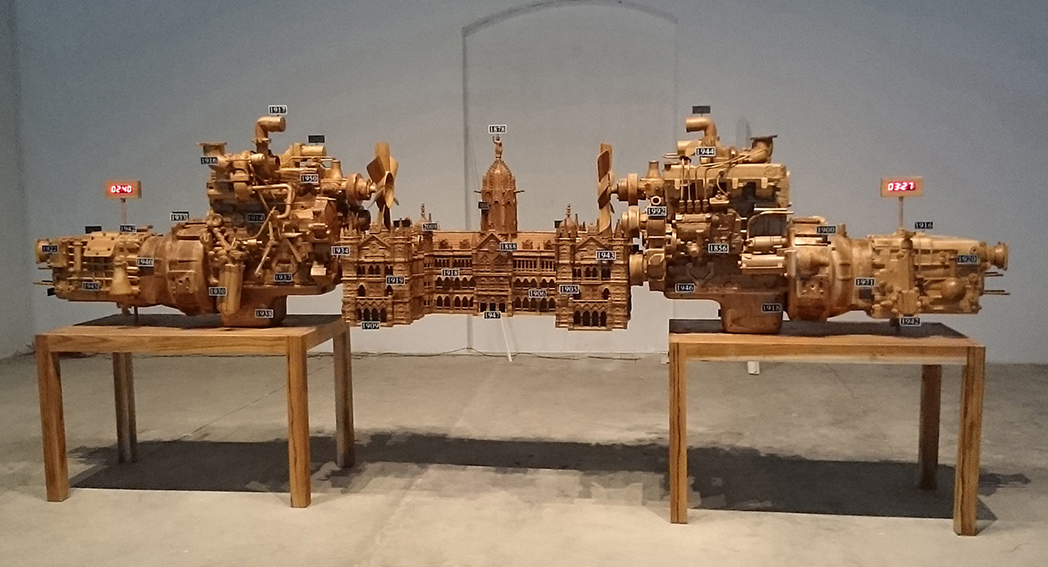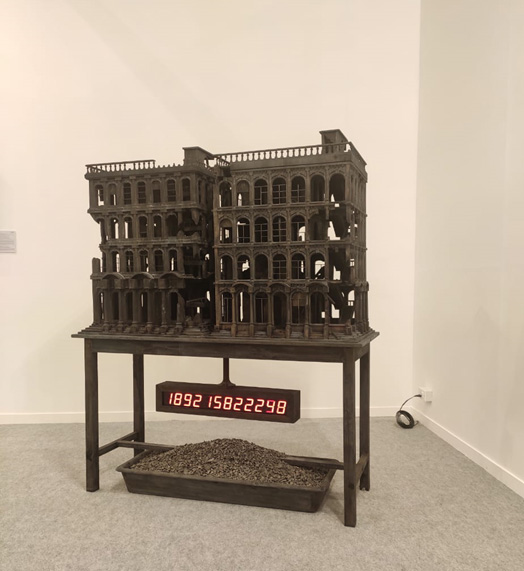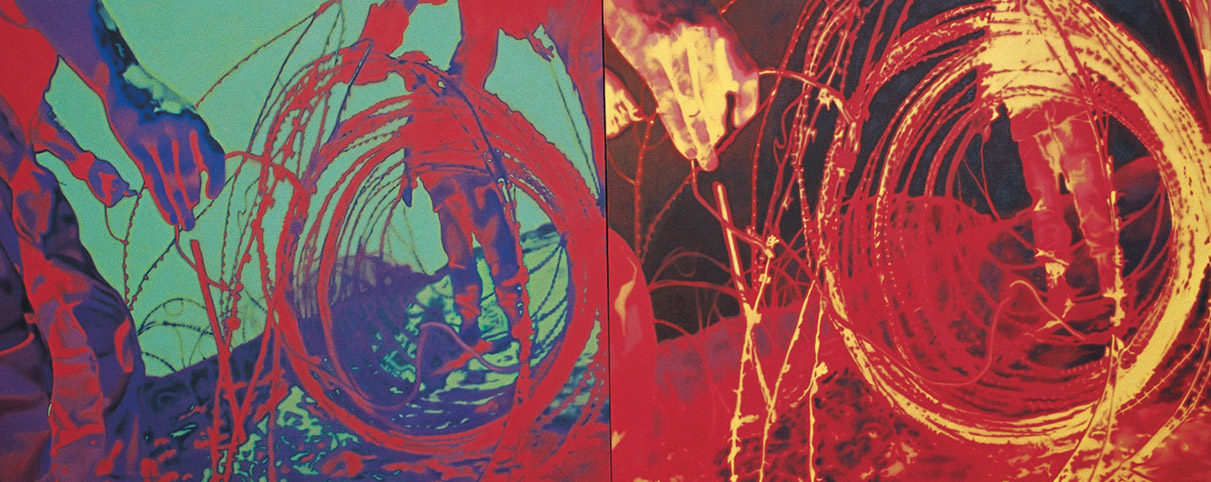|
CV
IMAGES
TEXTS
PUBLICATIONS
|
|
 |
|
 |
|
|
|
|
|
|
|
|
History Lab, 2016,
wood, metal and LED timers,
174 x 69 x 27 inches.
History Lab
looks at the industrial and technological development and their changing
relevance and symbolism. Santhosh recreates the wooden model of the
historical colonial building which was earlier called the Victoria
Terminus (V.T.) in Mumbai. The entire structure is held by giant engines
on both ends, each attached with LED timers. The sculpture is marked
with labels indicating years that seem historically significant. While
situating this work within the way the metaphors representative of
ideologies and time change their meaning in the course of transition,
Santhosh draws parallels with other examples. He states, "
the history
itself becomes a laboratory of conflict. Imageries emblematic of
ideologies, power centres and time change their meaning in the course of
changing times. Like how a grand structure like the V. T. Station that
once represented colonial power changed its meaning and became almost
like the heart of the city and represented the aspirations of the
people. Like this how these smoke and fire spitting chimneys that were
once the symbol of progress have changed their meaning if seen through
new ecological perspective. In a way this work is an attempt at
understanding last two centuries, reading through the high points of
changes and events that eventually shaped our time."
|
|
History Lab III, 2020,
Wood, LED and stone, 65 x 53 x 22 inches
"This work is a third installment in this series
dealing with the idea of understanding history through different
narratives, various perspectives and by meddling around with the
information which may further problematize our perceptions about the
idea of where did things go wrong. It is also a process of tracing back
the nature of important events that changed the course of our history.
Here, this work is more like an apocalyptic vision of the world, an
attempt to look into the future through the imprints of our turbulent
past taken out from the history books and multitudes of imageries
projected and filtered into our psyche through news reports of the
present. It is more about a kind of prophetic imagination derived out of
an attempt to understand the destructive elements that are deeply
embedded in the dynamics of human psyche and its evolution. This work
deals with an image of desolate and broken buildings, possibly destroyed
in a war, attached with a timer device in countdown format that is set
up for an approximate time of nearly seventy nine years in relation to
an average life expectancy of human beings in this planet".
|
|
|
|
|
|
|
|
|
|
|
|
|
 |
|
 |
|
|
|
|
|
Untitled,
2018, watercolour on paper, 60 x 40 inches
From the recent series of watercolour paintings, it
presents the imagery in an unusual 'theatrical' manner. The central
character is seated in front of a pair of amputated limbs, holding an
empty rattrap while the white rats move about. The entire scene unfolds
on a mat floating against dramatic floral background. While speaking
about the distinct ways in which the watercolors are conceived, Santhosh
says, "In each work, the protagonist tries to identify with a different
character, from an army personnel to a political prisoner; from an
activist to a victim; to tell stories of current global happenings with
the help of various props ranging from weapons, prosthetics, bones, rat
trap, handheld flags that are sold on the streets, toys and so on. Each
of these props is laden with multilayered associations and stories that
we hear on an everyday basis. The stories about hate speeches, border
issues, atrocities committed by men in the name of religion, its
eventual human displacement and suffering can be unfolded as the
narrative progresses. And in some works the background takes the role of
antithesis to the centre image in the form of a tapestry of botanical
plants, and in some, it assumes the role of a virtual medicinal garden
in order to bring in an element of hope and healing, as an antidote to
a way to deal with the turbulent reality we live in".
|
|
Fear Nation and False Promises,
2004, oil on canvas, 40 x 120 inches (diptych)
One of Santhosh‟s significant oil paintings from the
early period when he started employing the technique of recreating the
effect of colour photographic negatives, it presents an obscure scenario
of unidentifiable figures working with barbed wires reckoning the
images of political conflicts. The image repeats on the right panel
presenting another shot‟, much in the manner of frames from
photographic negatives. Every detail of the painting is rendered in
patches of red, green, blue, brown, and a tinge of yellow obvious
elements become distorted and the obscure factors come glaring into the
fore. The blazing, combustive effect manifests the element of fear.
|
|
|
|
|
|
|
|
|
|
|
|
|
| |
| |
|
|
|
|
|
|
|
|
|
|
|
|
![]()